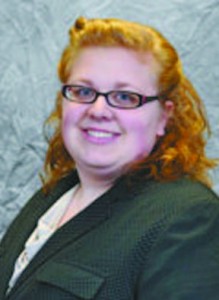July 1, 2019
Ask the Audiologist
 By Emily Steffel, Au.D., CCC-A
By Emily Steffel, Au.D., CCC-A
Audiology Consultants, P.C.
Q: I have difficulty hearing in noisy places. Can hearing aids help with that?
A: Hearing aids can help with hearing in noisy places. However, no hearing aid can make the noise go away completely. Noisy places are difficult to hear in for everyone, whether they have hearing loss or not. Speech is made up of mostly high-frequency sounds and noise is made up of mostly low-frequency noise. Low frequencies travel further than high frequencies because they have more energy so the speech gets lost in all the noise.
Imagine you are in the car at a stoplight and the person next to you has their car radio turned up loud. Think about what kind of sound you hear. Is it the lyrics of the song or is it the thumping bass? It is the “bass” or low frequencies that have the power to make it through the air in that person’s car, through the metal door and glass window of their car, through the air between the cars, through the metal and glass of your car, and through the air in your car, and into your ear at a loud enough level that the ear sends the sound up to the brain.
Having hearing loss makes it even harder to hear the high frequencies through the low-frequency noise because most people have the greatest loss in the high frequencies. The hearing aid manufacturers know this and have been working (and continue to work) on ways to increase the high-frequency speech sounds while decreasing the low-frequency noise. Hearing aids listen to the sounds coming in and treat each type of sound differently to help the user hear more clearly what a person is saying.
Low-frequency noise vs. high-frequency speech is only half the battle of hearing in noisy places, however. The hearing aid manufacturers also know that sometimes speech is an undesired sound as well, such as “I don’t want to hear the people talking at the table behind me but do want to hear the people at my table”. Therefore hearing aids also use directionality. Your brain uses the timing and volume differences to tell where a sound comes from; that’s why you can close your eyes and point to where the person speaking is standing or can tell in the dark that it was a knock on the window vs. a knock on the door. The hearing aid uses the same concept to determine where a sound came from. The aid then assumes that you will face the most important sound source when your listening environment is “complex”, just like your brain does. So speech sounds that come from in front get increased and speech from in back, as well as “noise only” sounds, get decreased.
However, all this technology can only help ensure that the clearest signal arrives in your ears. What your nerves and brain do with it once it leaves the hearing aid has a huge impact on how well you hear and understand speech. No matter what hearing aids you wear, if you have only “fair” or “poor” word understanding in quiet places you may never hear perfectly in noisy places, but you will definitely hear better.
Emily Steffel is an audiologist at Audiology Consultants, P.C. For more information consult our ad in this publication for store locations and phone numbers.
Filed Under: Health & Wellness
Trackback URL: https://www.50pluslife.com/2019/07/01/ask-the-audiologist-85/trackback/


